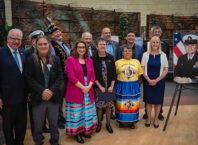HO-CHUNK NATION CASINO GOES SMOKE-FREE
ON AUG. 1
BLACK RIVER FALLS, Wis. – The
Ho-Chunk Nation is going smoke-free at its gaming facility in
Madison, Wisconsin.
Ho-Chunk Gaming Madison will be the
first tribal facility in the state to eliminate smoking. The change
goes into effect on Aug. 1.
Electronic cigarettes, however, will
continue to be allowed on the gaming floor. A separate area for
smokers of traditional cigarettes will be created away from the
facility.
“We still believe in providing areas
to accommodate all of our guests, but, want to assure the existing
building will be 100% smoke-free,” Daniel Brown, facility executive
manager, said.
The Wisconsin Smoke-Free Air Law,
which went into effect in July 2010, requires restaurants, bars,
entertainment venues and other public facilities to go smoke-free.
The law does not apply in Indian Country.
FLANDREAU SANTEE SIOUX TRIBE TO SELL
MARIJUANA BY YEAR’S END
FLANDREAU, S.D. – The Flandreau
Santee Sioux Tribe of South Dakota plans to sell marijuana by Jan. 1,
2016.
The tribal council voted 5-1 in
mid-June to legalize the drug for commercial, recreational and
medicinal use. Marijuana will be grown at a dedicated facility
located on the reservation. The drug will then be sold and consumed
at separate facility on the reservation. The tribe plans to welcome
all people – Indians and non-Indians – to the operation.
But South Dakota Attorney General
Marty Jackley said any non-Indians who consume marijuana on the
reservation will be in violation of state law. He asked the tribe to
work with the state to address law enforcement, safety and other
issues.
“I want to encourage tribal leaders
to continue to work with state authorities to better ensure our
respective laws are followed, public safety on our roads remains a
consideration, and that both Indian and non-Indian persons are not
put in harm’s way by the jurisdiction complexities being created by
our federal government,” Jackley said in a press release.
The tribe is the first in South Dakota
to legalize the drug and adopt a comprehensive set of laws and
policies to address its sale and use. Elsewhere in the state, drug
laws remain extremely strict.
The Department of Justice opened the
door to legal marijuana in Indian Country with the 2014 Wilkinson
memo. So far, only one tribe in California has started growing the
drug and local authorities plan to assert jurisdiction if they
believe the operation violates local laws.
The tribe is the first in South Dakota
to legalize the drug and adopt a comprehensive set of laws and
policies to address its sale and use. Elsewhere in the state, drug
laws remain extremely strict. The Department of Justice opened the
door to legal marijuana in Indian Country with the 2014 Wilkinson
memo.
S.D. BOARD WON’T BACK NAME CHANGE FOR
HARNEY PEAK
PIERRE, S.D. – The South Dakota Board
on Geographic Names voted 4-1 on June 29 to retain the name of Harney
Peak despite its connection to the massacre of tribal people.
Board members said the public does not
support a change to "Hinhan Kaga," the Lakota name for the
sacred site in the Black Hills. But confusion arose in the process
because the board initially considered "Black Elk Peak" as
the name.
The board in fact held five meetings
to discuss Black Elk Peak. According to news reports, there was near
unanimous support from the public for that name. Hinhan Kaga was a
newer suggestion. Officials in Pennington County opposed that name,
which translates to Place of Owls, according to Delphine Red Shirt, a
citizen of the Oglala Sioux Tribe.
Basil Brave Heart, Oglala, originally
proposed "Black Elk Peak" as the new name. Black Elk was an
Lakota medicine man who died in 1950. His proposal is being
considered by the U.S. Board on Geographic Names. The South Dakota
board’s vote will be considered as a recommendation as part of the
process.
Tribal citizens support a new name
because General William S. Harney led a massacre of the Lakota people
in 1854 during the Indian wars.
BOIS FORTE BAND OPENS SECOND TIM
HORTONS CAFE
TOWER, Minn. – The Bois Forte Band of
Ojibwe opened a second location of Tim Hortons Cafe & Bake Shop
located at The Y Store near Tower.
Tribal officials said the opening is
part of the tribe’s economic diversification strategy. “A lot of
hard work went into this project and we feel it’s just another way
for us to invest in our future," Norm Adams, the CEO of Bois
Forte Business Development, said.
The tribe also operates a Tim Hortons
at the nearby Fortune Bay Resort Casino. The Canadian-based fast
casual restaurant is known for its coffee and doughnuts.
OJIBWE LANGUAGE AND CULTURE CAMP SET
Minn. – The Red Lake Band of Ojibwe will host an Ojibwe Language
and Culture Camp from 9 a.m. to 6 p.m. July 21-23 p.m. at the Ponemah
Round House to help with the Red Lake Nation’s Ojibwemowin
Revitalization efforts.
The three-day camp is hosted by Red
Lake Chemical Health, Red Lake Economic Development and Planning, and
Oshkimaajitahdah (New Beginnings). It will feature canoeing,
lacrosse, Ojibwe bingo, a moccasin game, plant identification,
crafts, traditional Anishinaabe teachings and more, according to a
release. Transportation and meals are provided.
Admission is free but there is a
limited number of participants. For more information, contact Red
Lake Chemical Health at (218) 679-3392.
LEECH LAKE BAND OFFERS SUBSTANCE ABUSE
PREVENTION TRAINING
WALKER, Minn. – The Leech Lake Band
of Ojibwe, in collaboration with SAMHSA’s Center for the
Application of Prevention Techniques, will offer Substance Abuse
Prevention Skills Training for American Indians/Alaska Natives.
The training will be held July 13-16
from 9 a.m. to 4:30 p.m., at Northern Lights Casino in Walker, Minn..
The training combines online and
in-person components. It offers practitioners working with American
Indians or Alaska natives a comprehensive introduction to the
substance abuse prevention field.
Grounded in current research and
SAMHSA’s Strategic Prevention Framework, the training is designed
to help practitioners develop the knowledge and skills needed to
implement effective, data-driven prevention that reduces behavioral
health disparities and improves wellness. It is appropriate for entry
level practitioners as well as professionals in related fields.
The SAPST consists of a five-hour,
self-paced online module, followed by a four-day, 26-hour
interactive, in-person training.
The online module is now available.
Participants must complete the online module before July 13. To
register for both the online module and the in-person service, visit:
www.surveymonkey.com/r/register-CAPT-0794. For more information, call
Shawn MacGregor at 218-335-8371 or email
Shawn.macgregor@llojibwe.org.
A certificate for 31 hours of
participation will be provided through Central CAPT upon completion
of both the online module and in-person training.
ST. LOUIS RIVER WATERSHED PROVIDES
BILLIONS IN REVENUE
CLOQUET, Minn. – The Fond du Lac
Band, working with Earth Economics, of Seattle, Wash., commissioned a
study of the economic benefits of ecosystem goods and services
provided by the St. Louis River watershed.
Quantifying these benefits allows the
“natural capital” to be included in economic tools and
decision-making.
The St. Louis River provides an
estimated $5 billion to $14 billion in ecosystem service benefits per
year. The asset value of the watershed is between $273 billion and
$687 billion over 140 years.
Fond du Lac Chair, Karen Diver, says
"The Fond du Lac Band takes our environmental and cultural
stewardship of the St. Louis River watershed, our homeland, very
seriously. We understand the connection between healthy lands,
communities, and economies. We recognize that the lands and waters
must be conserved and protected for our shared benefit and future
generations. We hope this report generates discussion with local,
state and federal partners about how we can best invest in and
preserve these irreplaceable natural and cultural resources."
RECONCILIATION EFFORTS BEGIN IN BEMIDJI
BEMIDJI, Minn. – A movement led by
people in Bemidji and their neighbors both on and off nearby
reservations have set out to find a path to reconciliation between
whites and Native Americans.
No government is taking part; no plan
has been laid; no blame will be assessed; and no one knows how long
this journey might take. “Truth and reconciliation is not an
event,” Anton Treuer, Leech Lake Band of Ojibwe, one of the people
facilitating the process, said.
“It’s not something that happens
in a week, a month or a year. It’s a process and it might take a
really long time. If it’s just something short then it’s only
something to make people feel good rather than to really change the
culture and reconcile the historical experiences of diverse people.”
Treuer is an author and a professor at Bemidji State University.
The Blandin Foundation has been
sending people to participate in the Bemidji effort, at the
invitation of people in that group.
That kind of inclusiveness is equally
crucial. Justin Beaulieu, Red Lake Band of Ojibwe, said, “One of
our principles is to make sure the group is inclusive, to make sure
everyone can participate and they feel comfortable participating. Who
is at the table right now and who else needs to be?”
Part of the difficulty is the
inclination to put difficult events into the past and keep them
there. Beaulieu says, “For me, personally, I hear ‘Get over it’
all the time from people, or ‘We didn’t do that.’ I just want
people to understand, ‘Of course you didn’t do that, but it does
have residual effects that have come down the line. And there’s new
research being done that shows that those changes within the
physiology can be passed along. We are trying to get over it, but
it’s going to take help from everyone and understanding.”
Treuer summarized some of the
challenges. “You can only really influence people who are in the
room with you, so the goal is not to chase everybody away from the
table and sit there eating alone. That’s why a lot of these things
have failed in the past. If it goes too fast, then sometimes
non-Native folks get really uncomfortable and step away because
they’re way beyond their comfort zone, but if it goes too slowly
then a lot of times people of color feel like it’s a feel-good pat
on the back and nobody’s willing to do any real change. The trick
is to go a bit in between where everybody agrees to stretch the
bounds of their normal comfort and everybody agrees to be patient and
kind in going through that process at the same time.”
FORMER OMAHA TRIBE CHAIRMAN PLEADS
GUILTY IN FUND THEFT CASE
OMAHA, Neb. – Amen Sheridan, a former
chairman of the Omaha Tribe of Nebraska, admitted his role in a theft
case.
Sheridan, 54, pleaded guilty to
accessory after the fact to theft from an Indian tribal organization.
He admitted that he knew Julia Whiteskunk took money from the tribe’s
housing authority and used it as down payment for a house. He also
admitted the he helped her evade punishment.
Whiteskunk was serving as executive
director of the tribe’s housing authority at the time of the theft.
Sheridan was serving as chairman. She also was indicted and pleaded
not guilty to the charges. She died in September 2014.
Sheridan is due to be sentenced on
Sept. 14, a little over a year after Whiteskunk’s passing. He faces a
maximum of 2 years and 6 months in federal prison.






